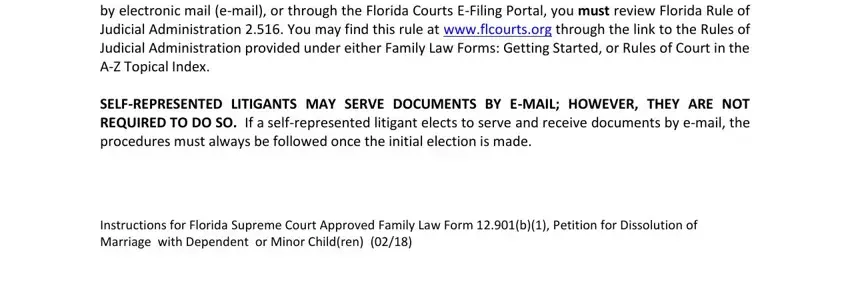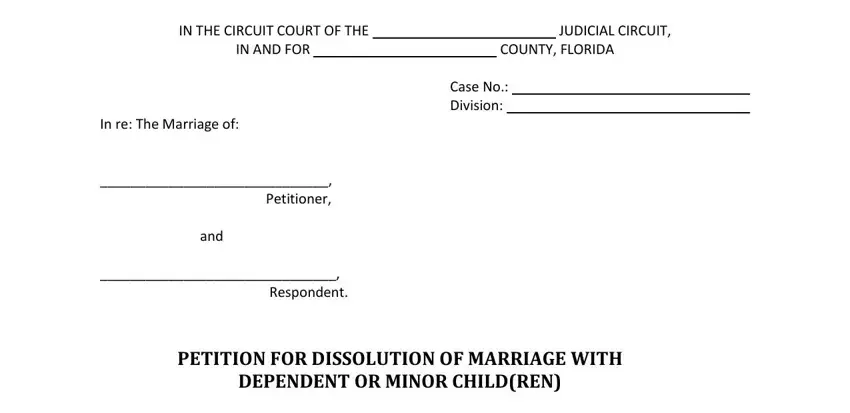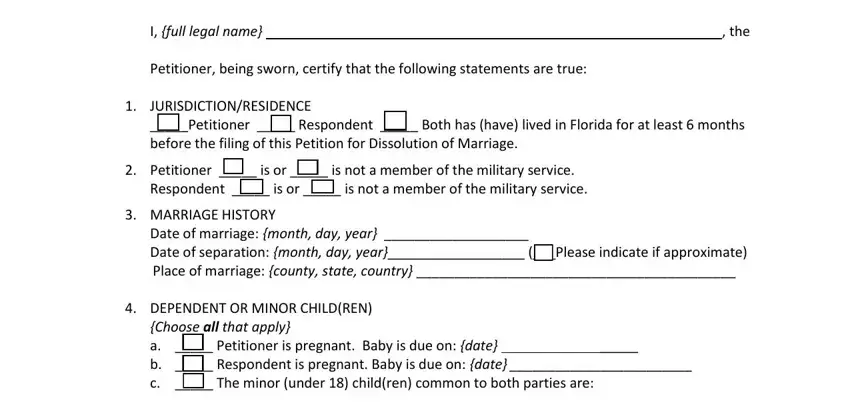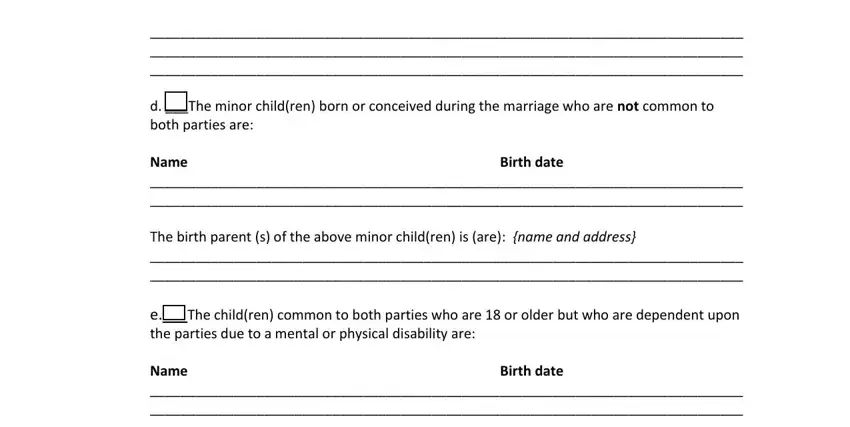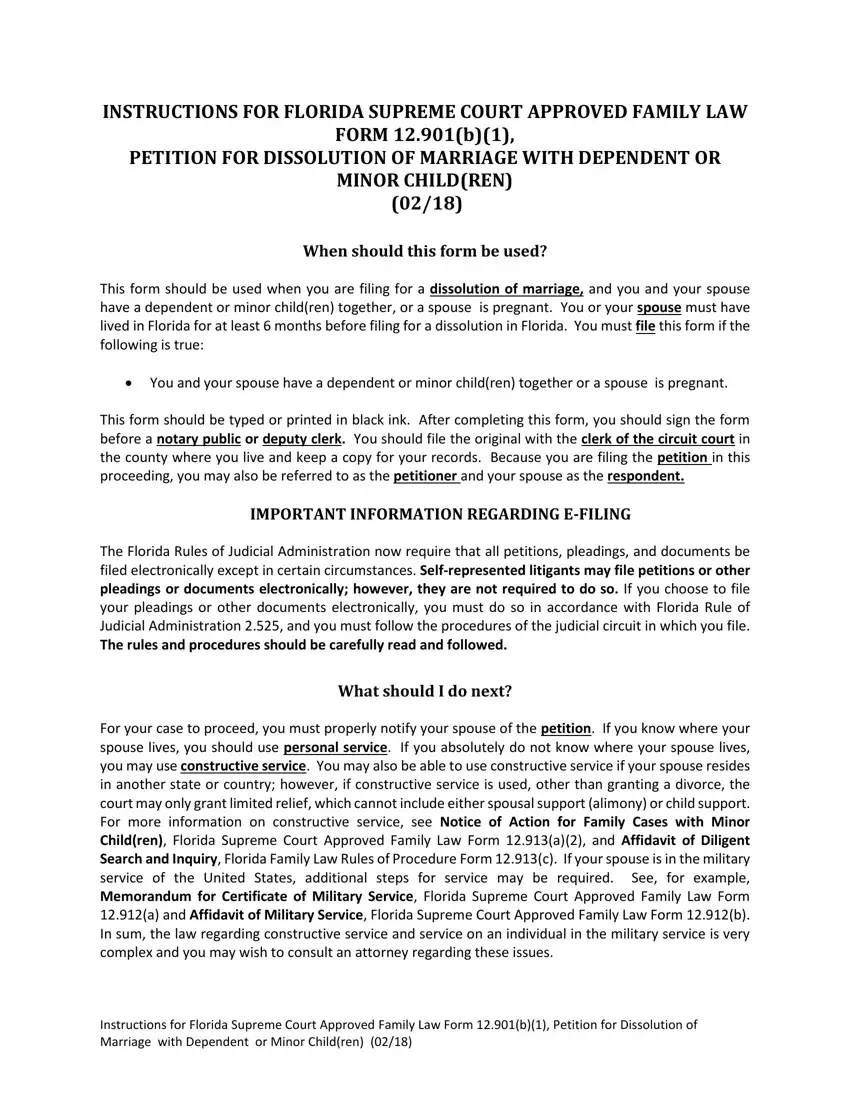INSTRUCTIONS FOR FLORIDA SUPREME COURT APPROVED FAMILY LAW
FORM 12.901(b)(1),
PETITION FOR DISSOLUTION OF MARRIAGE WITH DEPENDENT OR
MINOR CHILD(REN) (02/18)
When should this form be used?
This form should be used when you are filing for a dissolution of marriage, and you and your spouse have a dependent or minor child(ren) together, or a spouse is pregnant. You or your spouse must have lived in Florida for at least 6 months before filing for a dissolution in Florida. You must file this form if the following is true:
You and your spouse have a dependent or minor child(ren) together or a spouse is pregnant.
This form should be typed or printed in black ink. After completing this form, you should sign the form before a notary public or deputy clerk. You should file the original with the clerk of the circuit court in the county where you live and keep a copy for your records. Because you are filing the petition in this proceeding, you may also be referred to as the petitioner and your spouse as the respondent.
IMPORTANT INFORMATION REGARDING E-FILING
The Florida Rules of Judicial Administration now require that all petitions, pleadings, and documents be filed electronically except in certain circumstances. Self-represented litigants may file petitions or other pleadings or documents electronically; however, they are not required to do so. If you choose to file your pleadings or other documents electronically, you must do so in accordance with Florida Rule of Judicial Administration 2.525, and you must follow the procedures of the judicial circuit in which you file.
The rules and procedures should be carefully read and followed.
What should I do next?
For your case to proceed, you must properly notify your spouse of the petition. If you know where your spouse lives, you should use personal service. If you absolutely do not know where your spouse lives, you may use constructive service. You may also be able to use constructive service if your spouse resides in another state or country; however, if constructive service is used, other than granting a divorce, the court may only grant limited relief, which cannot include either spousal support (alimony) or child support. For more information on constructive service, see Notice of Action for Family Cases with Minor Child(ren), Florida Supreme Court Approved Family Law Form 12.913(a)(2), and Affidavit of Diligent Search and Inquiry, Florida Family Law Rules of Procedure Form 12.913(c). If your spouse is in the military service of the United States, additional steps for service may be required. See, for example, Memorandum for Certificate of Military Service, Florida Supreme Court Approved Family Law Form 12.912(a) and Affidavit of Military Service, Florida Supreme Court Approved Family Law Form 12.912(b). In sum, the law regarding constructive service and service on an individual in the military service is very complex and you may wish to consult an attorney regarding these issues.
Instructions for Florida Supreme Court Approved Family Law Form 12.901(b)(1), Petition for Dissolution of Marriage with Dependent or Minor Child(ren) (02/18)
If personal service is used, your spouse has 20 days to answer after being served with your petition. Your case will then generally proceed in one of the following three ways:
DEFAULT. If after 20 days, your spouse has not filed an answer, you may file a Motion for Default, Florida Supreme Court Approved Family Law Form 12.922(a), with the clerk of court. Then, if you have filed all of the required papers, you may contact the clerk, family law intake staff, or judicial assistant to set a final hearing. You must notify your spouse of the hearing by using a Notice of Hearing (General), Florida Supreme Court Approved Family Law Form 12.923, or other appropriate notice of hearing form.
UNCONTESTED. If your spouse files an answer that agrees with everything in your petition or an answer and waiver, and you have complied with mandatory disclosure and filed all of the required papers, you may contact the clerk, family law intake staff, or judicial assistant to set a final hearing. You must notify your spouse of the hearing by using a Notice of Hearing (General), Florida Supreme Court Approved Family Law Form 12.923, or other appropriate notice of hearing form.
CONTESTED. If your spouse files an answer or an answer and counterpetition, which disagrees with or denies anything in your petition, and you are unable to settle the disputed issues, you should file a Notice for Trial, Florida Supreme Court Approved Family Law Form 12.924, after you have complied with mandatory disclosure and filed all of the required papers. Some circuits may require the completion of mediation before a final hearing may be set. You should contact the clerk, family law intake staff, or judicial assistant for instructions on how to set your case for trial (final hearing). If your spouse files an answer and counterpetition, you should answer the counterpetition within 20 days using an Answer to Counterpetition, Florida Supreme Court Approved Family Law Form 12.903(d).
Where can I look for more information?
Before proceeding, you should read General Information for Self-Represented Litigants found at the beginning of these forms. The words that are in bold underline in these instructions are defined there. For further information, see chapter 61, Florida Statutes.
IMPORTANT INFORMATION REGARDING E-SERVICE ELECTION
After the initial service of process of the petition or supplemental petition by the Sheriff or certified process server, the Florida Rules of Judicial Administration now require that all documents required or permitted to be served on the other party must be served by electronic mail (e-mail) except in certain circumstances. You must strictly comply with the format requirements set forth in the Rules of Judicial Administration. If you elect to participate in electronic service, which means serving or receiving pleadings by electronic mail (e-mail), or through the Florida Courts E-Filing Portal, you must review Florida Rule of Judicial Administration 2.516. You may find this rule at www.flcourts.org through the link to the Rules of Judicial Administration provided under either Family Law Forms: Getting Started, or Rules of Court in the A-Z Topical Index.
SELF-REPRESENTED LITIGANTS MAY SERVE DOCUMENTS BY E-MAIL; HOWEVER, THEY ARE NOT REQUIRED TO DO SO. If a self-represented litigant elects to serve and receive documents by e-mail, the procedures must always be followed once the initial election is made.
Instructions for Florida Supreme Court Approved Family Law Form 12.901(b)(1), Petition for Dissolution of Marriage with Dependent or Minor Child(ren) (02/18)
To serve and receive documents by e-mail, you must designate your e-mail addresses by using the Designation of Current Mailing and E-mail Address, Florida Supreme Court Approved Family Law Form 12.915, and you must provide your e-mail address on each form on which your signature appears. Please CAREFULLY read the rules and instructions for: Certificate of Service (General), Florida Supreme Court Approved Family Law Form 12.914; Designation of Current Mailing and E-mail Address, Florida Supreme Court Approved Family Law Form 12.915; and Florida Rule of Judicial Administration 2.516.
Special notes...
If you do not have the money to pay the filing fee, you may obtain an Application for Determination of Civil Indigent Status from the clerk, fill it out, and the clerk will determine whether you are eligible to have filing fees deferred.
If you want to keep your address confidential because you are the victim of sexual battery, aggravated child abuse, aggravated stalking, harassment, aggravated battery, or domestic violence, do not enter the address, telephone, and fax information at the bottom of this form. Instead, file a Request for Confidential Filing of Address, Florida Supreme Court Approved Family Law Form 12.980(h).
With this form, you must also file the following:
Uniform Child Custody Jurisdiction and Enforcement Act (UCCJEA) Affidavit, Florida Supreme Court Approved Family Law Form 12.902(d).
Child Support Guidelines Worksheet, Florida Family Law Rules of Procedure Form 12.902(e), if you are asking that child support be ordered in the final judgment. (If you do not know your spouse’s income, you may file this worksheet after your spouse’s financial affidavit has been served on you.)
Affidavit of Corroborating Witness, Florida Supreme Court Approved Family Law Form 12.902(i)
OR photocopy of current Florida driver’s license, Florida identification card, or voter’s registration card (issue date of copied document must be at least six months before date case is actually filed with the clerk of the circuit court).
Marital Settlement Agreement for Dissolution of Marriage with Dependent or Minor Child(ren), Florida Supreme Court Approved Family Law Form 12.902(f)(1), if you and your spouse have reached an agreement on any or all of the issues.
Notice of Social Security Number, Florida Supreme Court Approved Family Law Form 12.902(j).
Family Law Financial Affidavit, Florida Family Law Rules of Procedure Form 12.902(b) or (c). (This must be filed with the petition if the petitioner seeks to establish child support. Otherwise, it must be filed within 45 days of service of the petition on the respondent.)
Certificate of Compliance with Mandatory Disclosure, Florida Family Law Rules of Procedure Form 12.932. (This must be filed within 45 days of service of the petition on the respondent, if not filed at the time of the petition, unless you and your spouse have agreed not to exchange these documents.)
Parenting Plan, Florida Supreme Court Approved Family Law Form 12.995(a), (b), or (c). If the parents have reached an agreement, a signed and notarized Parenting Plan should be attached. If the parents have not reached an agreement, a proposed Parenting Plan may be filed.
Parenting Plan and Time-Sharing. If you and your spouse are unable to agree on parenting arrangements and a time-sharing schedule, a judge will decide for you as part of establishing a Parenting Plan. The judge
Instructions for Florida Supreme Court Approved Family Law Form 12.901(b)(1), Petition for Dissolution of Marriage with Dependent or Minor Child(ren) (02/18)
will decide the parenting arrangements and time-sharing based on the child(ren)’s best interests. Regardless of whether there is an agreement, the court reserves jurisdiction to modify issues relating to the minor child(ren).
The judge may request a parenting plan recommendation or appoint a guardian ad litem in your case. This means that a neutral person will review your situation and report to the judge concerning parenting issues. The purpose of such intervention is to be sure that the best interests of the child(ren) is (are) being served. For more information, you may consult section 61.13, Florida Statutes.
A parenting course must be completed prior to entry of the final judgment. You should contact the clerk, family law intake staff, or judicial assistant about requirements for parenting courses where you live.
Listed below are some terms with which you should become familiar before completing your petition. If you do not fully understand any of the terms below or their implications, you should speak with an attorney before going any further.
Shared Parental Responsibility
Sole Parental Responsibility
Supervised Time-Sharing
No contact
Parenting Plan
Parenting Plan Recommendation
Time-Sharing Schedule
Child Support. Both parents are required to provide financial support for their minor or dependent child(ren); however, the court may order one parent to pay child support to the other parent. Florida has adopted guidelines for determining the amount of child support to be paid. These guidelines are based on the combined income of both parents and take into account the financial contributions of both parents and the number of overnights the child(ren) spend with each parent. You must file a Family Law Financial Affidavit, Florida Family Law Rules of Procedure Form 12.902(b) or (c), and your spouse will be required to do the same. From your financial affidavits, you should be able to calculate the amount of child support that should be paid using the Child Support Guidelines Worksheet, Florida Family Law Rules of Procedure Form 12.902(e). Because the child support guidelines take several factors into consideration, change over time, and vary from state to state, your child support obligation may be more or less than that of other people in seemingly similar situations.
Alimony. Alimony may be awarded to a spouse if the judge finds that one spouse has an actual need for it and also finds that the other spouse has the ability to pay. If you want alimony, you must request it in writing in the original petition. If you do not request alimony in writing before the final hearing, it is waived (you may not request it later). You may request permanent alimony, bridge-the-gap alimony, durational alimony, , and/or rehabilitative alimony. If alimony is awarded, the judge may order periodic payments, payments in lump sum, or both.
Marital/Nonmarital Assets and Liabilities. Florida law requires an equitable distribution of marital assets and marital liabilities. “Equitable” does not necessarily mean “equal.” Many factors, including child support, time-sharing, and alimony awards, may lead the court to make an unequal (but still equitable) distribution of assets and liabilities. Nonmarital assets and nonmarital liabilities are those
Instructions for Florida Supreme Court Approved Family Law Form 12.901(b)(1), Petition for Dissolution of Marriage with Dependent or Minor Child(ren) (02/18)
assets and liabilities which the parties agree or the court determines belong to, or are the responsibility of, only one of the parties. If the parties agree or the court finds an asset or liability to be nonmarital, the judge will not consider it when distributing marital assets and liabilities.
Temporary Relief. If you need temporary relief regarding temporary use of assets, temporary responsibility for liabilities, parental responsibility and time-sharing with child(ren), temporary child support, or temporary alimony, you may file a Motion for Temporary Support and Time-Sharing with Dependent or Minor Child(ren), Florida Supreme Court Approved Family Law Form 12.947(a). For more information, see the instructions for that form.
Marital Settlement Agreement. If you and your spouse are able to reach an agreement on any or all of the issues, you should file a Marital Settlement Agreement for Dissolution of Marriage with Dependent or Minor Child(ren), Florida Supreme Court Approved Family Law Form 12.902(f)(1). Both of you must sign this agreement before a notary public or deputy clerk. Any issues on which you are unable to agree will be considered contested and settled by the judge at the final hearing.
Parenting Plan. In all cases involving minor or dependent child(ren), a Parenting Plan shall be approved or established by the court. If you and your spouse have reached an agreement, you should file one of the following: Parenting Plan, Florida Supreme Court Approved Family Law Form 12.995(a), Safety-Focused Parenting Plan, Florida Supreme Court Approved Family Law Form 12.995(b), or Relocation/Long- Distance Parenting Plan, Florida Supreme Court Approved Family Law Form 12.995(c), which addresses the time-sharing schedule for the child(ren). If you have not reached an agreement, a proposed Parenting Plan may be filed. If the parties are unable to agree, a Parenting Plan will be established by the court.
Final Judgment Form. These family law forms contain a Final Judgment of Dissolution of Marriage with Dependent or Minor Child(ren), Florida Supreme Court Approved Family Law Form 12.990(c)(1), which the judge may use if your case is contested. If you and your spouse reach an agreement on all of the issues, the judge may use a Final Judgment of Dissolution of Marriage with Dependent or Minor Child(ren) (Uncontested), Florida Supreme Court Approved Family Law Form 12.990(b)(1). You should check with the clerk, family law intake staff, or judicial assistant to see if you need to bring a final judgment with you to the hearing. If so, you should type or print the heading, including the circuit, county, case number, division, and the parties’ names, and leave the rest blank for the judge to complete at your hearing or trial.
Nonlawyer. Remember, a person who is NOT an attorney is called a nonlawyer. If a nonlawyer helps you fill out these forms, that person must give you a copy of a Disclosure from Nonlawyer, Florida Family Law Rules of Procedure Form 12.900(a), before he or she helps you. A nonlawyer helping you fill out these forms also must put his or her name, address, and telephone number on the bottom of the last page of every form he or she helps you complete.
Instructions for Florida Supreme Court Approved Family Law Form 12.901(b)(1), Petition for Dissolution of Marriage with Dependent or Minor Child(ren) (02/18)
IN THE CIRCUIT COURT OF THE |
|
|
|
|
JUDICIAL CIRCUIT, |
IN AND FOR |
|
|
COUNTY, FLORIDA |
|
|
Case No.: |
|
|
|
Division: |
In re: The Marriage of: |
|
|
|
|
|
______________________________, |
|
|
|
|
|
Petitioner, |
|
|
|
|
|
and |
|
|
|
|
|
_______________________________, |
|
|
|
|
|
Respondent. |
|
|
|
|
|
PETITION FOR DISSOLUTION OF MARRIAGE WITH
DEPENDENT OR MINOR CHILD(REN)
I, {full legal name} |
|
, the |
Petitioner, being sworn, certify that the following statements are true:
1.JURISDICTION/RESIDENCE
_____Petitioner _____ Respondent _____ Both has (have) lived in Florida for at least 6 months before the filing of this Petition for Dissolution of Marriage.
2.Petitioner _____ is or _____ is not a member of the military service. Respondent _____ is or _____ is not a member of the military service.
3.MARRIAGE HISTORY
Date of marriage: {month, day, year} ___________________
Date of separation: {month, day, year}__________________ (___Please indicate if approximate)
Place of marriage: {county, state, country} __________________________________________
4.DEPENDENT OR MINOR CHILD(REN) {Choose all that apply}
a. _____ Petitioner is pregnant. Baby is due on: {date} |
_____ |
b._____ Respondent is pregnant. Baby is due on: {date} ________________________
c._____ The minor (under 18) child(ren) common to both parties are:
NameBirth date
______________________________________________________________________________
______________________________________________________________________________
______________________________________________________________________________
Florida Supreme Court Approved Family Law Form 12.901(b)(1), Petition for Dissolution of Marriage with Dependent or Minor Child(ren) (02/18)
______________________________________________________________________________
______________________________________________________________________________
______________________________________________________________________________
d. ___The minor child(ren) born or conceived during the marriage who are not common to both parties are:
NameBirth date
______________________________________________________________________________
______________________________________________________________________________
The birth parent (s) of the above minor child(ren) is (are): {name and address}
______________________________________________________________________________
______________________________________________________________________________
e.___The child(ren) common to both parties who are 18 or older but who are dependent upon the parties due to a mental or physical disability are:
NameBirth date
______________________________________________________________________________
______________________________________________________________________________
5.A completed Family Law Financial Affidavit, Florida Family Law Rules of Procedure Form 12.902(b) or (c) {choose only one} _____ is filed with this petition or _____ will be timely filed.
6.A completed Uniform Child Custody Jurisdiction and Enforcement Act (UCCJEA) Affidavit, Florida Supreme Court Approved Family Law Form 12.902(d), is filed with this petition. (You must complete and attach this form in a dissolution of marriage with minor child(ren)).
7.A completed Notice of Social Security Number, Florida Supreme Court Approved Family Law Form 12.902(j), is filed with this petition.
8.This petition for dissolution of marriage should be granted because: {Choose only one}
a. ____ The marriage is irretrievably broken.
OR
b.____ One of the parties has been adjudged mentally incapacitated for a period of 3 years prior to the filing of this petition. A copy of the Judgment of Incapacity is attached.
SECTION I. MARITAL ASSETS AND LIABILITIES
1.____ There are no marital assets or liabilities.
OR
Florida Supreme Court Approved Family Law Form 12.901(b)(1), Petition for Dissolution of Marriage with Dependent or Minor Child(ren) (02/18)
2.____ There are marital assets or liabilities. All marital and nonmarital assets and liabilities are (or will be) listed in the financial affidavits, Florida Family Law Rules of Procedure Form 12.902(b) or (c), filed in this case.
{Indicate all that apply}
a.____ All marital assets and liabilities have been divided by a written agreement between the
parties, which is attached, to be incorporated into the final judgment of dissolution of marriage. (The parties may use Marital Settlement Agreement for Dissolution of Marriage with Dependent or Minor Child(ren), Florida Supreme Court Approved Family Law Form 12.902(f)(1).
b.____ The Court should determine how the assets and liabilities of this marriage are to be
distributed, under section 61.075, Florida Statutes.
c.____ Petitioner ____Respondent should be awarded an interest in the other spouse’s
property because:
______________________________________________________________________________
______________________________________________________________________________
______________________________________________________________________________
______________________________________________________________________________
SECTION II. SPOUSAL SUPPORT (ALIMONY)
1.____ Petitioner ____Respondent forever gives up any right to spousal support (alimony) from the other spouse.
OR
2.____ Petitioner _____Respondent requests that the Court order the other spouse to pay the following spousal support (alimony) and claims that he or she has an actual need for the support that he or she is requesting and that the other spouse has the ability to pay that support. Spousal support (alimony) is requested in the amount of $________________ every: _____
week _____ other week _____ month, or _________other ________________ beginning {date}
________________ and continuing until {date or event} ___________________________.
Explain why the Court should order _____Petitioner _____Respondent to pay, and any specific request(s) for type of alimony (temporary, permanent, bridge-the-gap, durational, rehabilitative, and/or lump sum):
.
3._____Other provisions relating to alimony, including any tax treatment and consequences:
______________________________________________________________________________
______________________________________________________________________________
______________________________________________________________________________.
Florida Supreme Court Approved Family Law Form 12.901(b)(1), Petition for Dissolution of Marriage with Dependent or Minor Child(ren) (02/18)

4._____ Petitioner requests life insurance on the other spouse’s life, provided by that spouse, to secure such support.
SECTION III. PARENTING PLAN ESTABLISHING PARENTAL RESPONSIBILITY AND TIME-SHARING
1.The minor child(ren) currently reside(s) with _____ Petitioner _____ Respondent _____ Other: {explain} ___________________________________________________________
2.Parental Responsibility. It is in the child(ren)’s best interests that parental responsibility be: {Choose only one}
a.____ shared by both parents;
b.____ awarded solely to _____ Petitioner _____ Respondent . Shared parental responsibility
would be detrimental to the child(ren) because:________________________
______________________________________________________________________________
______________________________________________________________________________
______________________________________________________________________________.
3.Parenting Plan and Time-Sharing. It is in the best interests of the child(ren) that the family be ordered to comply with a Parenting Plan that _____ includes _____ does not include parental time- sharing with the child(ren). For purposes of a Parenting Plan, the Petitioner will be referred to as {name or designation}____________________, and the Respondent will be referred to as {name or designation}_________________________________. The Petitioner states that it is in the best interests of the child(ren) that:
{Choose only one}
a.____ The attached proposed Parenting Plan should be adopted by the court. The parties
{Choose only one} _____ have _____ have not agreed to the Parenting Plan.
b. _____Each child will have time-sharing with both parents as follows: __________________
_____________________________________________________________________
_____________________________________________________________________
____________________________________________________________________________
(_____ Indicate if a separate sheet is attached.)
c. ____ The court should establish a Parenting Plan with the following provisions for:
{Insert name or designation of the appropriate parent in the space provided}
____ No time-sharing for Parent _____________
____ Limited time-sharing with Parent __________
____ Supervised Time-Sharing for Parent ___________Parent___________;
____ Supervised or third-party exchange of the child(ren).
____ Explain:
______________________________________________________________________________
______________________________________________________________________________
______________________________________________________________________________
4.Explain why this request is in the best interests of the child(ren):
______________________________________________________________________________
______________________________________________________________________________
______________________________________________________________________________
______________________________________________________________________________.
Florida Supreme Court Approved Family Law Form 12.901(b)(1), Petition for Dissolution of Marriage with Dependent or Minor Child(ren) (02/18)
SECTION IV. CHILD SUPPORT {Choose all that apply}
1._____Petitioner requests that the Court award child support as determined by Florida’s child support guidelines, section 61.30, Florida Statutes. A completed Child Support Guidelines Worksheet, Florida Family Law Rules of Procedure Form 12.902(e), _____ is, or _____ will be filed. Such support should be ordered retroactive to:
a.____ the date of separation {date} _________________________.
b.____ the date of the filing of this petition.
c. ____ other {date} ____________ {explain} ___________________________________.
2._____Petitioner requests that the Court award child support to be paid beyond the age of 18 years because:
a.____ the following child(ren) {name(s)}
is (are) dependent because of a mental or physical incapacity which began before the age of 18. {explain}
.
b.____ the following child(ren) {name(s)}______________________________is (are) dependent
in fact, is (are) in high school, and are between the ages of 18 and 19; said child(ren) is (are) performing in good faith with reasonable expectation of graduation before the age of 19.
3._____Petitioner requests that the Court award a child support amount that is more than or less than Florida’s child support guidelines and understands that a Motion to Deviate from Child Support Guidelines, Florida Supreme Court Approved Family Law Form 12.943, must be filed before the Court will consider this request.
4._____Petitioner requests that medical/dental insurance for the minor child(ren) be provided by:
{Choose only one}
a.____ Petitioner
b.____ Respondent.
5._____Petitioner requests that uninsured medical/dental expenses for the child(ren) be paid: {Choose only one}
a.____by Petitioner;
b.____by Respondent;
c.____equally by the spouses {each spouse pays one-half}.
d.____according to the percentages in the Child Support Guidelines Worksheet, Florida Family Law Rules of Procedure Form 12.902(e).
e.____Other {explain}: __________________________________________________________
______________________________________________________________________________
______________________________________________________________________________
Florida Supreme Court Approved Family Law Form 12.901(b)(1), Petition for Dissolution of Marriage with Dependent or Minor Child(ren) (02/18)
